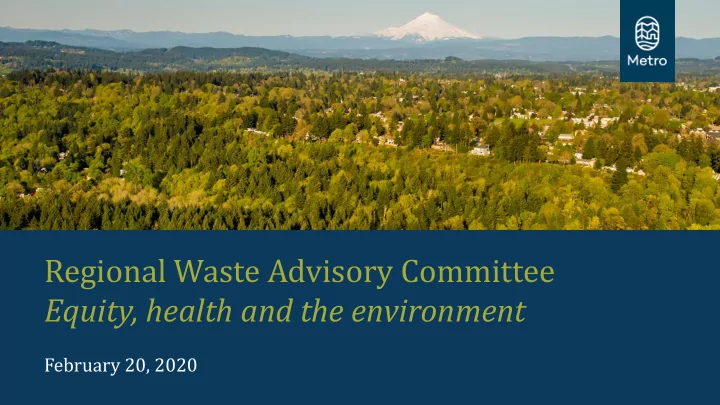

Regional Waste Advisory Committee Equity, health and the environment February 20, 2020
Today’s discussion Consideration of Minutes (Nov. 2019 & Jan. 2020) Local Government’s Role with Discard Management Food Waste Disposal Ban Extended Producer Responsibility Policy Overview Metro South Transfer Station Tour (what you saw & learned) Closing and Adjourn Metro | Regional Waste Advisory Committee
Local Government’s Role with Discard Management
LOCAL GOVERNMENT’S ROLE WITH DISCARDS MANAGEMENT Oversight Education Policies Regional Waste Advisory Committee 02/20/20
SOLID WASTE SYSTEM MANAGEMENT • State sets goals and direction, conducts research, and protects air and groundwater • Metro sets regional program standards, regulates where material goes after collection, owns two public transfer stations • Local government regulates collection • Private companies collect material and own and operate facilities
GARBAGE & RECYCLING SYSTEM
RESIDENTIAL WASTE COLLECTION • franchising residential collection companies • enforcing service standards • setting rates- process establishes the fee hauling companies can charge customers for providing residential garbage, recycling, and composting collection • supporting and educating system users
BUSINESSES AND MULTIFAMILY (COMMERCIAL) WASTE COLLECTION • franchising commercial collections companies • NOTE: Portland commercial haulers are permitted and are not franchised/rate-regulated • NOTE: Gresham C&D open market collection • enforces service standards • establishing and ensuring compliance with City / County requirements • supporting and educating system users
SYSTEM USERS COMMERCIAL RESIDENTIAL
WASTE STREAM BY USERS residential business multifamily construction
WASTE STREAM Tons recovered: , 1,130,317 Tons disposed: , 1,281,096
HAULER FRANCHISES
PRIVATE HAULERS Residential & Commercial Independent Residential Jurisdiction Collection Recyclers Only Beaverton 5 Clackamas County 13 Gresham 5 Portland 27 11 Washington County 9
GARBAGE
MIX RECYCLING
GLASS
YARD DEBRIS
+ FOOD SCRAPS
WHAT’S IN OUR GARBAGE? DEQ Material Recovery Generation Rates Report 2016
RATES & SERVICE
RESIDENTIAL RENTALS LANDLORD RESPONSIBILITIES
RULES & ENFORCEMENT
DISPOSAL
EDUCATIONAL MATERIALS
ASSISTANCE
MASTER RECYCLER VOLUNTEERS
COMMUNITY ENGAGEMENT CONT.
REGIONAL INITIATIVES
THANK YOU!
Food Waste Disposal Ban
IN CONSIDERATION OF RESOLUTION NO. 20-5067, FOR THE PURPOSE OF SETTING AN EFFECTIVE DATE OF JANUARY 31, 2025 FOR PROHIBITING THE LANDFILL DSIPOSAL OF COMMERCIALLY-DERIVED FOOD WASTE GENERATED WITHIN THE REGION. Date: January 6, 2020 Prepared by: Jennifer Erickson, 503-797- Department: Property & Environmental 1647, Services jennifer.erickson@oregonmetro.gov Meeting Date: January 21, 2020 ISSUE STATEMENT The purpose of this resolution is to set an effective date for a commercial food waste disposal prohibition. ACTION REQUESTED Adopt Resolution No. 20-5067. IDENTIFIED POLICY OUTCOMES Resolution 20-5067 directs staff to develop Metro Code and administrative rule language to prohibit the disposal of commercially-derived food waste generated within the Metro region with an effective date of January 2025. In a work session held on October 29, 2019, the Metro Council determined that it would be inadvisable to proceed with an Ordinance and Rule without an established disposal prohibition effective date that allows for appropriate stakeholder engagement and directed staff to move forward with developing Ordinance and Rule with an effective date of January 2025. POLICY QUESTION(S) Should Metro enact a prohibition on the disposal of food waste generated by businesses in order to increase the recovery of food waste for beneficial us and decrease the negative climate impacts of disposal? If so, is January 31, 2025 Council’s preferred effective date for implementing the prohibition? STAFF RECOMMENDATIONS Adopt Resolution No. 20-5067, with an effective date of January 31, 2025.
STRATEGIC CONTEXT & FRAMING COUNCIL DISCUSSION Much like existing bans on the disposal of hazardous and electronic waste, the goal of a prohibition on the disposal of commercial food waste is to protect human health and the environment and to help educate generators about the proper management of solid waste. In addition, a disposal prohibition provides a firm backstop to the business food waste collection requirement — local governments can leverage the future ban in their efforts to assist businesses with implementing collection programs now. The implementation of a disposal prohibition also helps to meet Regional Waste Plan and larger climate goals. Relationship to Metro’s Regional Waste Plan: Goal 6 : Reduce product environmental impacts and waste through educational and behavioral practices related to prevention and better purchasing choices. Action6.5 : Assist households and businesses in the adoption of practices that prevent the wasting of food and other high-impact materials Goal 10 : Provide regionally consistent services for garbage, recyclables and other priority materials that meet the needs of all users. Action 10.1 : Provide comprehensive collection services and supporting education and assistance for source-separated recyclables, source separated food scraps and garbage, in compliance with state, regional and local requirements, including the Regional Service Standard, Business Recycling Requirement and Business Food Waste Requirement in Metro Code. Goal 12 : Manage all garbage and recycling operations to reduce their nuisance, safety and environmental impacts on workers and the public. Action 12.6 : Regulate facilities accepting garbage, recycling, food scraps, yard debris and other solid waste generated from the region to advance progress toward achieving Regional Waste Plan goals. Support for climate goals: Landfills are significant emitters of methane, and food scraps are a primary contributor to the production of methane in landfills. Currently, food represents the single largest component of the region’s disposed waste stream (18%). Methane is a very potent greenhouse gas — 28 to 36 times that of CO2 over a 100- year period. Methane emitted today lasts a decade on average, which is much less time than CO 2, however methane absorbs much more energy than CO 2 . The net effect of the shorter lifetime and higher en ergy absorption is reflected in methane’s much higher global warming potential. Methane also accounts for some indirect effects; it is a precursor to ozone, and ozone is itself a potent greenhouse gas. The goal of collecting food scraps is to capture the environmental and economic benefits of turning that material into useful products, creating energy and
Recommend
More recommend